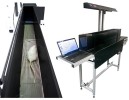Authors
Mlost, M Kostrzewa, M Borczyk et al
Lab
Department of Neurochemistry, Maj Institute of Pharmacology, Polish Academy of Sciences, Cracow, Poland
Journal
Biomedicine & Pharmacotherapy
Abstract
Background and purpose: The endocannabinoid system became a promising target for osteoarthritis (OA) treatment. Functional selectivity of cannabinoids may increase their beneficial properties while reducing side effects. The aim of the present study was to evaluate the analgesic potential of two functionally biased CB2 agonists in different treatment regimens to propose the best pharmacological approach for OA management.
Experimental approach: Two functionally selective CB2 agonists were administered i.p. - JWH133 (cAMP biased) and GW833972A (beta-arrestin biased), in a chemically induced model of OA in rats. The drugs were tested in acute and chronic treatment regimens. Analgesic effects were assessed by pressure application measurement and kinetic weight bearing. X-ray microtomography was used for the morphometric analysis of the femur's subchondral bone tissue. Underlying biochemical changes were analysed via RT-qPCR.
Key results: Dose-response studies established the effective dose for both JWH133 and GW833972A. In chronic treatment paradigms, JWH133 was able to elicit analgesia throughout the course of the experiment, whereas GW833972A lost its efficacy after 2 days of treatment. Later studies revealed improvement in subchondral bone architecture and decrement of matrix metalloproteinases and proinflammatory factors expression following JWH133 chronic treatment.
Conclusion and implications: Data presents analgesic and disease-modifying potential of CB2 agonists in OA treatment. Moreover, the study revealed more pronounced tolerance development for analgesic effects of the beta-arrestin biased CB2 agonist GW833972A. These results provide a better understanding of the molecular underpinnings of the anti-nociceptive potential of CB2 agonists and may improve drug development processes for any cannabinoid-based chronic pain therapy.
BIOSEB Instruments Used:
Kinetic Weight Bearing (BIO-KWB-DUAL)

 Douleur - Allodynie/Hyperalgésie Thermique
Douleur - Allodynie/Hyperalgésie Thermique Douleur - Spontanée - Déficit de Posture
Douleur - Spontanée - Déficit de Posture Douleur - Allodynie/Hyperalgésie Mécanique
Douleur - Allodynie/Hyperalgésie Mécanique Apprentissage/Mémoire - Attention - Addiction
Apprentissage/Mémoire - Attention - Addiction Physiologie & Recherche Respiratoire
Physiologie & Recherche Respiratoire
 Douleur
Douleur Métabolisme
Métabolisme Système moteur
Système moteur Neurodégénérescence
Neurodégénérescence Thématiques transversales
Thématiques transversales Système musculaire
Système musculaire Functions de motricité générale
Functions de motricité générale Troubles de l'humeur
Troubles de l'humeur Other disorders
Other disorders Joints
Joints Système Nerveux Central (SNC)
Système Nerveux Central (SNC)  Système sensoriel
Système sensoriel
